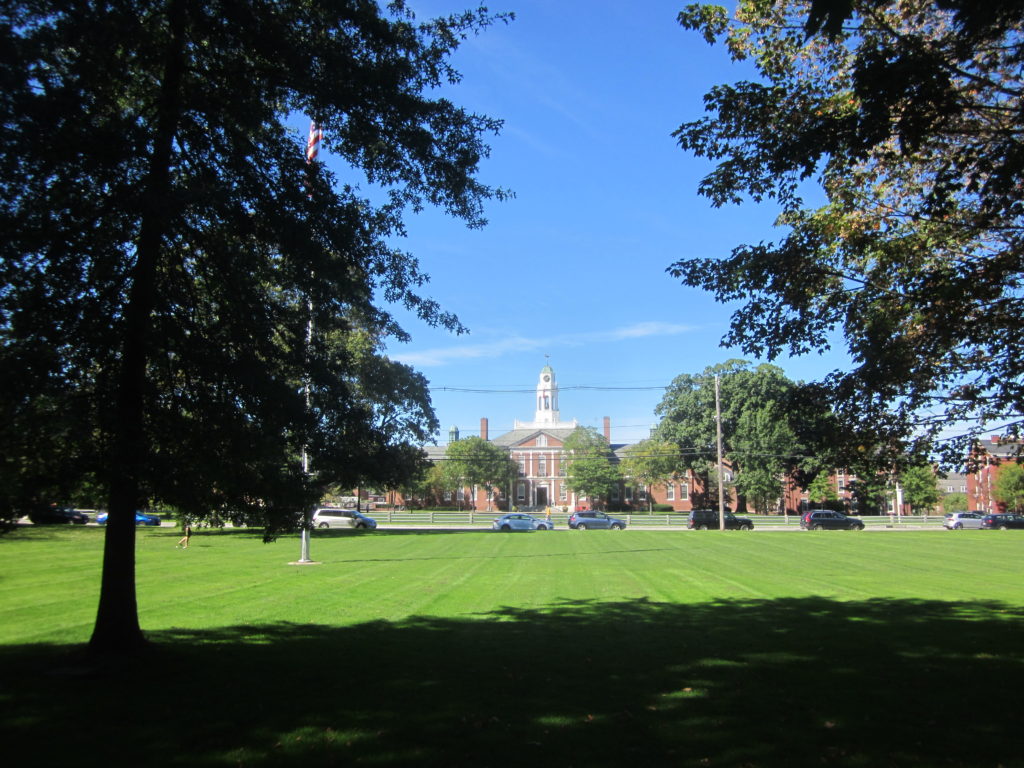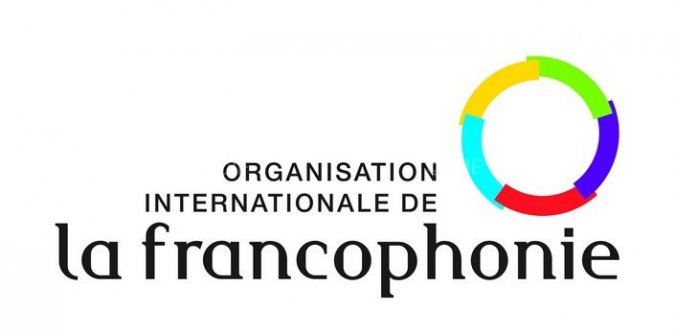Yesterday, in celebration of Francophonie Day at Phillips Exeter Academy, I was invited to deliver the event’s keynote address. I gladly share my prepared remarks here.
Thank you, all, for your presence here. I salute your interest in this language that bring us together—not merely today, I hope, but throughout the year. Thank you especially to Sam Park, who made this event possible and who kindly invited me. I appreciate the opportunity to share a few thoughts as a native speaker, as a historian, and as a teacher. In the process, I plan to speak to the relationship between this French-speaking world we call la Francophonie and the mighty experiment that is the Great Republic.
Some of you may know that I am an offshoot of a strange and impenetrable race we call French Canadians. The term suggests that we are a special brand of Canadian, as though we prefer to have our universal health care with a splash of Bordeaux. Certainly, many French Canadians are eager to stress their Canadianness and I wish to take nothing away from that identity. But, as a scholar of Franco-American studies, I also want to recognize the term used in many publications as Americans began to encounter on their own soil a growing number of French Canadians in the nineteenth century. This term, Canadian French, hinted at an inherent Frenchness and at the possibility of a larger francophone world. From 1840 to 1930, approximately one-million people of French descent left the Province of Quebec to settle permanently on U.S. soil, where they sought broader economic opportunities. Initially, these immigrants seemed to embrace identifications to metropolitan France. Many of their early community celebrations on U.S. soil were held under the tricolore; their pageants honored the Marquis de La Fayette, the French general and statesman, over and above many of their own home-grown heroes. We know, in retrospect, why this was: facing prejudice, the immigrants expected a heartier welcome by claiming some close association with a European power and a long-time ally. There was power in this claimed identity. Their case was borne out during the First World War when, in the eyes of some, the Great Republic repaid its founding debt. The French had made the victory of Yorktown possible; now, the United States helped liberate northern and eastern France. In the summer of 1917, an American general, or perhaps one of his subordinates, seems to have spoken that famous and felicitous phrase that is still with us: La Fayette, nous voilà! As this country honored its alliance and sought to assert its founding values, it seemed to assure Franco-Americans their place in the sun, at long last.

Well, history is never that simple. As my History 420 students will tell you, the next three years witnessed a spike in nativist feeling. Through “one-hundred-percent Americanism,” the anti-radicalism of the first Red Scare, and immigration restriction, government and people questioned dubious allegiances and sought to ensure cultural homogeneity. In tones all too familiar today, concern about a way of life and about American institutions became, in its self-imposed shroud of fear, an ultimatum: Americanize or leave our United States of America. Franco-Americans were spared the worst of this nativism, but whether because or in spite of their inherent Frenchness may be to ask the wrong question. They had begun their ascent into an English-speaking, middle-class voting public. For a time, it seemed that they could be French as long as they were American first. We cannot, should not diminish the struggles they continued to face, but by the 1920s Franco-Americans were secure in their status as a white population, now on the cusp of participating in a privileged, majoritarian nation—in many places they would be a model minority. Through all of this, Franco-Americans’ connection to metropolitan France, which had seemed to promise so much, mattered rather little, even for Social Darwinists so interested in racial and ethnic essence.
In Quebec, this Frenchness was blocked by fear of the anticlerical demons unleashed, allegedly, by the French Revolution. Since the 1790s France had, it seemed, more than once lost its way. Yet, Quebec’s religious elites could not in its stead turn to the United States—Anglo-Saxon, Protestant, materialistic, democratic, corrupt America. Horror. They even went so far as to deem French-Canadian immigrants to the U.S. traitors, men and women of low morals, lost to the nation. But there was a way out, intellectually. People and elites in Quebec remained attached to a more primordial Frenchness that was distinctly Roman Catholic—a common French identity inherited from pre-revolutionary days. France had been the eldest daughter of the Catholic Church; the baton then passed to the descendants of New France, though now in their British captivity. Let’s call this reluctant adherence to a larger francophone world.
Already, then, we see that this Frenchness is interpreted differently, and to various ends, even among France’s former settlers in North America. It can be intrinsic, or ideological; it is in conversation with Americanism and can draw towards it, or away. And the idea of Frenchness becomes yet more complex, multilayered, when interpreted linguistically, as we do today. Qu’est-ce qui nous unit? What unites us who are French speakers, if anything at all? Historically, as we have seen, it is not merely filial piety or devotion to France, nor a unilateral rejection of American culture, whatever that means. Could it be about power? The mother country that gave us this beautiful tongue and its worldview was a colonizing nation. At the same time, French became in many places the language of the oppressed. My language has two faces and few are those of us who have had the privilege of choosing which of these masks we want to wear.
Sometimes Catholic, but not always; powerful and powerless; American and not; white and non-white—perhaps we are on to something here with this broad, undefined, uncertain, uneasy Frenchness. As a historian, I am inclined to leave this question open. Yet I also trust that my field of study can help us cultivate empathy. Good history is a chorus of voices and, from hearing one another’s voices in care and charity, I believe we can build bridges. Now, if only we could hear those voices in a shared language… but wait! What about French? What about French? I do not mean to be facetious. Why should we see in la Journée internationale de la Francophonie anything but the opportunity to reach out and listen? We should embrace this amorphous, contradictory means whose ambiguity may actually be its strength. Like history, the French language promises encounters and, I would hope, understanding.
All of this—including the ambiguous Frenchness—is part of my heritage and I suspect that many of you approach this part of your identity with caution or mixed sentiments. But it is more than heritage: it is also personal experience. Having spent the better part of the last seven years in New England, I have often taken for granted the opportunity to utilize this Frenchness. I suppose it is because most of us who set foot on U.S. soil want to be part of this bold national experiment and indeed be considered fully American; too often, we sacrifice our cultural agency in the process. But, speaking quite personally, my perspective has recently changed. You see, it is on U.S. soil that I met the woman who became my wife. She is of Franco-American descent and, through the difficult choices her ancestors made in the process of becoming American, the French language was lost. Until recently, that is: in the last months, she has been learning French. Might I add, she is coping remarkably well with our fifteen verb tenses. As to why an apple is feminine, but a grape masculine, we are still scratching our heads.
From seeing my ambitious partner engage in this hard work, I am more than ever seeing its merits. She is broadening her field of vision. This summer she may see Quebec as Quebeckers see it. I hope that those of you here who are taking French classes will also seek out those voices. There are, in short, many grammatical reasons to despise French, many historical reasons to feel ambivalent about it, and, today, many social and cultural reasons to appreciate it. Let us then look at the history of this language, let us hear its varied intonations, its varied perspectives, its cultural inflections, its eccentricities. Let us transcend power relations by listening to the chorus of voices that this global language necessarily offers. Je veux entendre Haïti, et l’Algérie, et le Liban, et La Réunion, et le Vietnam, et la Polynésie, et la Louisiane, et le Québec, et Bruxelles. Everywhere we look, there she is, La Francophonie, this wonderful vehicle, this wonderful channel by which we can connect.

On this day, March 20, one hundred years ago, long before there was a Francophonie Day, that celebrated Quebec newspaper, Le Devoir, shared its own defense of the French language. Quoting one of the province’s leading figures, the paper shared the high hopes vested in French Canada by virtue of its tongue. Some of those ideas may not be surprising considering the period: French communicated the essence of the race; it was the prime means of exchange for “civilized” peoples. Most significant of all, this noble tongue was to be (and I quote) “an impenetrable barrier against menacing Americanization” and “an unshakeable rampart standing against the advances of Bolshevik socialism.” Evidently, this was an age of anxiety—doubly so in Quebec, where concerns about cultural survival added to the larger social and ideological anxieties of the time. I suspect we are all weary of talk of walls. I will resist it. I will also leave Quebec politics in Quebec. But I will express appreciation for the wholly different spirit embedded in the notion of francophonie, a forum, not a fortress.
One final thought—The frame of reference I have offered here is American, from my own heritage to French-Canadian immigrants, from my wife’s American upbringing to the worries animating Quebec in 1919—oh, and by the way, this Francophonie Day event is happening in quintessential New England. I think we need to take care not to engage in Manichean thinking that sets up American cultural imperialism as an easy foil. I love this country’s idealism, its continuous striving, and its many cultures. As francophones and francophiles, we should approach other cultures without the sense of siege that drives so much discussion on culture in the modern world—without the apprehension that has often isolated peoples from one another, French Canadians and Americans for instance. We have the means to reach out, to unite, to combine, to recombobulate, to hyphenate. On this day, we can be both American French and Franco-American. Let us embrace that proposition.
Let us keep connecting and—this is the teacher speaking—let us keep learning from one another in the year ahead.
Query the Past will have another new, and somewhat more conventional, blog post next week. For more on Exeter’s Franco-American history, keep an eye out for a post that should appear in three weeks.
Leave a Reply